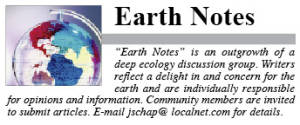Earth Notes: The sun shines equally on all — or does it?
Over 1,000 years ago, John Chrysostom wrote, “We do not need to buy air, water, fire, sunshine, and things of this kind. God has given enough of all these blessings for everyone to enjoy them freely. The sun shines equally on the rich and the poor, and they both breathe the same air.â€
After a thousand years, there are still enough of these God-given blessings for everyone. What’s changed is that these things are now for sale, and the rich and the poor don’t breathe the same air. Over 3.7 million people die each year from air pollution, says the World Health Organization, and this toll falls heaviest on children and the elderly who disproportionately experience the burden, with 88% of the premature deaths occurring in low- and middle-income countries. Numbers reported by Reuters and the CDC indicate that last year, air pollution killed more people than AIDS, malaria and ebola combined.
Most sources of outdoor air pollution are well beyond the control of individuals and demand action by citizens and policymakers at all levels. In addition, indoor smoke is a serious health risk for some three billion people who cook and heat their homes with open wood, charcoal and refuse fires. Some 4.3 million premature deaths were attributable to household air pollution in 2012. Almost that entire burden was in low- and middle-income countries. Many of these people don’t have electricity or other sources of clean cooking and heating fuel, nor the option of cooking outside when they don’t own the land around the meager shelter that is their home. I almost said “that they call home,†but the sad reality is that for millions, where they live is not their home, but a refugee camp or temporary housing far from the home from which they were displaced by conflict, environmental disaster, corporate agriculture, or massive hydropower projects.
The World Health Organization sets a standard for healthy air. Most air in America falls below this threshold, though Los Angeles, Pittsburgh and other U.S. cities surpass it. In China, the poor don’t breathe the same air as the rich. Residents of Xingtai inhale 10 times as much pollution as Pittsburghers, and in much of China, pollution is over six times as bad as in L.A. Nearly a third of China’s economy is in exports, the largest share going to the United States. We import more goods from China than from any other country. Our demand for cheap goods is driving — is funding — the pollution that is killing the poor who have no say in their government’s policies.
The World Bank says almost half the world’s population lives on less than $2.50 a day. It’s a misleading statistic. It’s not like “Europe on $5 a day.†When 22,000 children die each day of starvation, one can hardly claim they’re “living.†Nearly eight million people will die of hunger this year, even though, today as much as when John Chrysostom wrote, the earth produces enough food for everyone. Saint John was no socialist; in fact he said that, “Commerce in itself is not bad; indeed it is an intrinsic part of God’s order. What matters is how we conduct our commerce.†John had a vision of the world as it should be, a world where the wealthy would have concern for those in need. He objected to the world as it is, in hope that the world could be restored to what it can be.
- Quotations from On Living Simply: The Golden Voice of John Chrysostom, compiled by Robert Van de Weyer, Liguori 1997.



